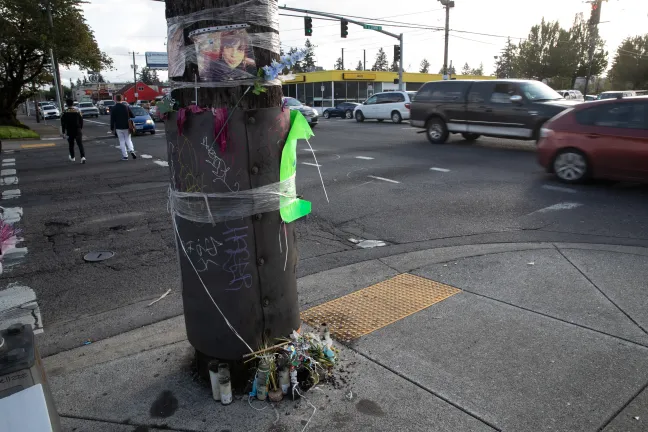Use the word “crash” instead of “accident.” Focus on the people, not the cars. And make sure to include broader trends rather than reporting on isolated events.
These are just some of the best practices shared with participants during two online forums that the Multnomah County Health Department presented on how to effectively report on traffic crashes.
The Health Department hosted its second online learning session this Wednesday, which brought together local public agencies, traffic safety advocates, and members of the news media.
The discussion was sparked in large part by an alarming increase in deaths and serious injuries from traffic crashes across the Portland metro area. In Multnomah County, there have been more than 80 deaths in each of the last two years, a major increase over prior years. As recently as 2014, the County experienced a low of 28 traffic crash deaths. The recent surge prompted Health Department employees to team up with advocates, law enforcement, public health, and transportation agencies to better understand the troubling trends.
“We need new solutions,” Charlene McGee, REACH program manager, said after March 2 workshop with safety advocates. “Crash deaths are increasing and it’s an issue disproportionately affecting Black people in Multnomah County.”
McGee said when people see media coverage focusing on single crashes but don’t see data on the trend of increasing crash deaths, people can fail to feel the gravity of the problem. Research shows that when news coverage highlights the larger story with context, it gets people more in a mindset of finding solutions instead of blaming individuals.
Inspiring new thinking
The Health Department’s two learning sessions, In February and March 2022, were funded by a health equity grant from the Regional Planning Association.
More than 75 representatives from local law enforcement, transportation and health agencies, attended as well as safety advocates from the community and members of the media.
"The words that reporters and government officials use in public can be a powerful force for change," said Dylan Rivera, spokesperson for the Portland Bureau of Transportation. "When we use words that obscure the role of the driver in a crash, or make traffic deaths sound like accidents, we reduce the public's understanding of this public health crisis. Reporting that mentions the contributing factors that most often lead to traffic deaths — and describes the strategies communities are undertaking to make our streets safer— can empower the public to advocate for solutions that can save lives."
Best practices for reporting on crashes
Among the information shared during the two sessions were best practices on how the media reports traffic crashes:
- Use the term “crash” rather than “accident” in describing an incident.
- Focus on the action of the driver rather than the pedestrian or cyclist.
- The driver is the acting agent. Don’t refer to the vehicle as if it is acting on its own.
- Stick to confirmed facts and omit unsupported statements that imply blame.
- Provide broad context and patterns to underscore that a single crash is not an isolated occurrence.
An analysis of local media coverage about pedestrian and cyclist fatalities over the past few years showed:
- Nearly all Portland area media use the preferred term “crash.”
- Most stories focus attention on the pedestrian or cyclist, and refer to the vehicle, and not the driver.
- The actions of the pedestrian or cyclist are often reported with an implication of blame.
- Most news stories provide little to no context or patterns. However, some robust reporting did link multiple crashes, included quotes from area residents and springboarded to discussions about policy and solutions.
Moving forward
These sessions are just the start to an ongoing conversation to reframe how traffic crashes are reported. Attendees expressed their commitment to being a part of this collaborative effort. It will take a concerted effort by all contributors – from local public agencies to community advocates to reporters and editors.
“We all have a role to play in finding solutions to the public health problem of traffic crash deaths,” said Brendon Haggerty, Multnomah County’s Healthy Homes and Communities supervisor. “And I’m thrilled to see so much engagement from the folks who are best positioned to make a difference.”
For more information, please contact Brendon Haggerty, interim supervisor of the Healthy Homes and Communities Program at Multnomah County Health Department brendon.haggerty@multco.us.

